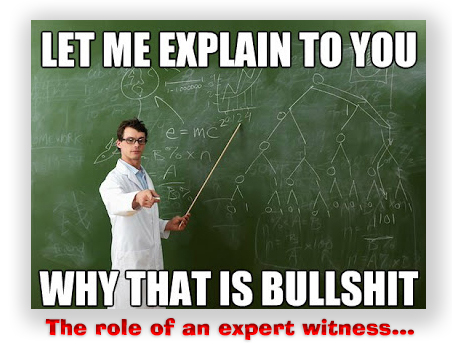We post news and comment on federal criminal justice issues, focused primarily on trial and post-conviction matters, legislative initiatives, and sentencing issues.

DID EXPERTS JUST GET A LOT MORE USEFUL?
 It is a fundamental principle of common law that witnesses can only testify about what they saw, heard or felt. They are not allowed to expound any deductions based on the facts. That being the case, expert testimony—testimony given by someone with knowledge or experience in a particular field or discipline that renders an opinion based on the facts—ought to be an abomination.
It is a fundamental principle of common law that witnesses can only testify about what they saw, heard or felt. They are not allowed to expound any deductions based on the facts. That being the case, expert testimony—testimony given by someone with knowledge or experience in a particular field or discipline that renders an opinion based on the facts—ought to be an abomination.
But it’s a necessary abomination. So necessary that experts, once qualified as such by the presiding judge, can give opinions on just about anything, even the ultimate issues in the case (such as “the defendant was negligent,” “calling some a ‘scumbag’ is not defamatory,” or “the substance the defendant possessed was fentanyl”).
But after John Hinckley, the man who shot President Reagan in order to impress actress Jodie Foster, was found not guilty by reason of insanity after a battle of experts arguing that he was or was not nuts, Federal Rule of Evidence 704(b) was adopted to hold that while experts could issue all other ultimate-issue opinions from the stand, “[i]n a criminal case, an expert witness must not state an opinion about whether the defendant did or did not have a mental state or condition that constitutes an element of the crime charged or of a defense.”
Yesterday, the Supreme Court crafted an end-around to 704(b), a decision that may reverberate to the benefit of criminal defendants as much as it benefitted the government in the case before the Justices.
 Adriana Diaz was arrested at the United States-Mexico border after the door frames of the car she was driving were found to be packed with illegal drugs hidden in the door frames. At trial, Adriana argued that the car was not hers, that she was driving it as a favor, and that she had no idea of what was under the door panels.
Adriana Diaz was arrested at the United States-Mexico border after the door frames of the car she was driving were found to be packed with illegal drugs hidden in the door frames. At trial, Adriana argued that the car was not hers, that she was driving it as a favor, and that she had no idea of what was under the door panels.
A government expert testified that “most” drug mules knew what they were carrying because drug traffickers do not typically entrust drugs to an unknowing person. The jury, apparently concluding that Adriana was like “most” drug mules, convicted her.
Adriana argued that the government expert had violated 704(b) because he had testified to her mental state. However, in a 6-3 ruling, SCOTUS upheld the expert testimony in a fine case of hair-splitting: “An expert’s conclusion that ‘most people’ in a group have a particular mental state is not an opinion about ‘the defendant’ and thus does not violate Rule 704(b),” Justice Clarence Thomas wrote for the majority.
 Justice Ketanji Brown Jackson, the most experienced Justice on the court in criminal defense work, wrote in a concurring opinion that “the type of mental-state evidence that Rule 704(b) permits can prove essential not only for prosecutors, but for defendants as well.” She could be right, especially where novel defenses–such as diminished capacity arguments (think ‘battered women’ defenses)–are used.
Justice Ketanji Brown Jackson, the most experienced Justice on the court in criminal defense work, wrote in a concurring opinion that “the type of mental-state evidence that Rule 704(b) permits can prove essential not only for prosecutors, but for defendants as well.” She could be right, especially where novel defenses–such as diminished capacity arguments (think ‘battered women’ defenses)–are used.
However, in a vigorous dissent, Justice Neil Gorsuch (joined by Justices Sonia Sotomayor and Elana Kagan), complained that the decision let
[t]he government come[] away with a powerful new tool in its pocket. Prosecutors can now put an expert on the stand — someone who apparently has the convenient ability to read minds — and let him hold forth on what “most” people like the defendant think when they commit a legally proscribed act. Then, the government need do no more than urge the jury to find that the defendant is like “most” people and convict. What authority exists for allowing that kind of charade in federal criminal trials is anybody’s guess, but certainly it cannot be found in Rule 704.
Diaz v. United States, Case No. 23-14, 2024 U.S. LEXIS 2709 (June 20, 2024)
Courthouse New Service, SCOTUS won’t restrict expert testimony in drug trafficking case (June 20, 2024)
Sentencing Law and Policy, Supreme Court, by 6-3 vote, rejects claim that mental state expert testimony violated FRE 704(b) (June 20, 2024)
– Thomas L. Root

